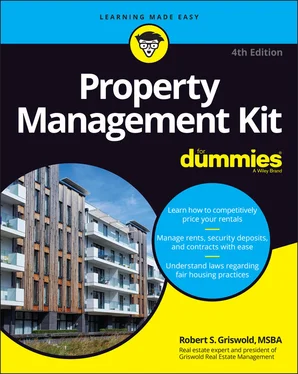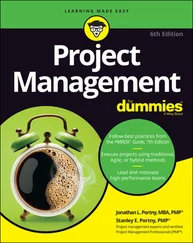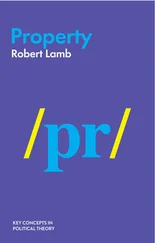Understanding what a good property manager does
Professional property managers normally handle a wide range of duties. If you hire a full-service management company, you typically get the following services:
Performance of rental market surveys and advice on setting the rental rate and security deposit
Preparation, advertisement, and showing of the rental unit
Tenant screening, selection, and handling tenant move-in, including documenting in writing the pre-move-in inspection
Preparation of leases or rental agreements and all legal forms
Property physical and/or visual drive-by inspection periodically as agreed
Collecting rent, making bank deposits, and paying bills (including mortgage, property taxes, and insurance if the owner doesn’t pay them directly)
Preparation of regular monthly accounting reports
Quality repair and maintenance of the rental unit
Timely response to tenant complaints and/or maintenance requests
Enforcement of the rules and regulations and compliance with laws
 Although I usually recommend full-service management, you can pay for only the items that tickle your taste buds instead of shelling out for the full-course menu by working with more limited or à la carte management services. Maybe you need help only with the rental of your property and are willing to pay a leasing fee, or perhaps you want a property manager who charges a small fee to cover basic rent collection and accounting services and not much more.
Although I usually recommend full-service management, you can pay for only the items that tickle your taste buds instead of shelling out for the full-course menu by working with more limited or à la carte management services. Maybe you need help only with the rental of your property and are willing to pay a leasing fee, or perhaps you want a property manager who charges a small fee to cover basic rent collection and accounting services and not much more.
Telling the good from the bad
A good management company may be able to operate your rental properties better and more efficiently than you can on your own. Its superior knowledge and experience can result in lower costs, higher rents, better residents, and a well-maintained property. A good management company more than pays for its costs, giving you more time to take up additional properties or other pursuits. A poor management company can cut into your profits through fees, improper maintenance, or poor-quality tenants who run your property into the ground. A bad property manager can leave you in worse shape than if you’d never hired one in the first place.
The right property manager can make a big difference in the cash flow your rental unit generates because they find good replacement tenants quickly or make sure that maintenance is done in a timely manner without breaking your budget. You need a property manager who’s committed to helping you get the optimum results from your rentals. The following sections help identify what to think about when searching for a management company and what to ask potential managers so you can find the right fit.
 A good property manager always remembers that the rental property belongs to the owner, not to the property manager. That means they should seek your input so you can work together to formulate a property management plan that achieves your personal investment goals.
A good property manager always remembers that the rental property belongs to the owner, not to the property manager. That means they should seek your input so you can work together to formulate a property management plan that achieves your personal investment goals.
Finding the right management company for you
You want to find a property management company that suits you. Size isn’t the only determining factor in whether a property manager can deliver quality service. Some management companies specialize in large rental projects, whereas small operations may focus on individual home rentals and apartment buildings with only a few units. Don’t assume that a big company that manages mega-complexes will do the best job for your duplex or that a small company has the credentials, experience, and knowledge you need for your larger property. Try to find property managers who are active in the area and who specialize in your type and size of rental property.
Keep the following tips in mind to select the management company that best fits you and your property:
Make sure that the firm you hire manages property exclusively. This guideline is particularly important when you’re selecting a management company for a single-family home, condo, or very small rental property. Many traditional real estate sales offices (as opposed to property management firms) offer property management services, but property management is often a loss leader, meaning that it costs more for the real estate office to manage your property than it’s charging you for that service, because it’s hoping to get your business when you’re ready to sell the property. Many property managers in real estate sales offices don’t have the same credentials, experience, and expertise as employees of property management firms. The skills required to represent clients in selling property are entirely different from the skills required in managing property. You can always hire a firm that sells only real estate when the time comes to sell your rental property.
Verify that the property manager and the management company have current licenses that are in good standing. You can call or go online to double-check. Most states require property managers to have a real estate license and/or a property manager’s license. Simply holding a license doesn’t ensure exceptional service, but it does show that the property manager is motivated enough to comply with state law. The pandemic contributed to a recent significant rise in unemployment, which led to increases in the number of unlicensed people offering their services as property managers. Often, they may be managing properties that they partially own themselves and are exempt from state licensing laws, but they’re breaking the law in most states if they manage a rental property that they don’t own. Working with one of these people can lead to serious liability for you if a problem arises and it turns out that you used an unlicensed property manager. Always, always make sure that the property manager you’re considering has a current license, designations/certifications, and proper insurance coverage.
Examine the property manager’s credentials. The Institute of Real Estate Management (IREM) provides professional designations and certifications, including the Certified Property Manager (CPM) designation and the Accredited Residential Manager (ARM) certification. A select group of management firms have earned the Accredited Management Organization (AMO) accreditation. These designations and certifications signify excellence and dedication. Go online to www.wiley.com/go/propertymanagementkitfd4e for a full overview of IREM’s professional credentials and designations.
Confirm that the company is properly insured. The management company should carry insurance for general liability, automobile liability (owned and non-owned), workers’ compensation, and professional liability. The company is your agent and will collect your rents and security deposits, so it should have a fidelity bond to protect you in case an employee embezzles or mishandles your money.
Ensure that the company has separate bank trust accounts for each client. State licensing agencies perform detailed accounting and bank record audits upon receiving complaints, but they also perform routine audits. The most common scenario involves finding missing or commingled client funds when property managers use a master trust account (a single bank account for multiple unrelated clients). Although this practice is legal in most states, look for a company that has a separate bank account for each client and can offer separate accounting for each property it manages. Even though it is widely known that single master trust bank accounts can easily result in unintentional commingling or have trust fund shortages, many property managers use such accounts for all their managed properties to minimize their bank charges. Avoid any property management company that follows this practice, because the risk is not worth the savings of a monthly bank account charge. Typically, property management companies don’t pass these bank fees on to their clients, so there is no reason not to insist that your property manager keep all your funds in a separate bank trust account exclusively for your rental properties.
Читать дальше

 Although I usually recommend full-service management, you can pay for only the items that tickle your taste buds instead of shelling out for the full-course menu by working with more limited or à la carte management services. Maybe you need help only with the rental of your property and are willing to pay a leasing fee, or perhaps you want a property manager who charges a small fee to cover basic rent collection and accounting services and not much more.
Although I usually recommend full-service management, you can pay for only the items that tickle your taste buds instead of shelling out for the full-course menu by working with more limited or à la carte management services. Maybe you need help only with the rental of your property and are willing to pay a leasing fee, or perhaps you want a property manager who charges a small fee to cover basic rent collection and accounting services and not much more. A good property manager always remembers that the rental property belongs to the owner, not to the property manager. That means they should seek your input so you can work together to formulate a property management plan that achieves your personal investment goals.
A good property manager always remembers that the rental property belongs to the owner, not to the property manager. That means they should seek your input so you can work together to formulate a property management plan that achieves your personal investment goals.










